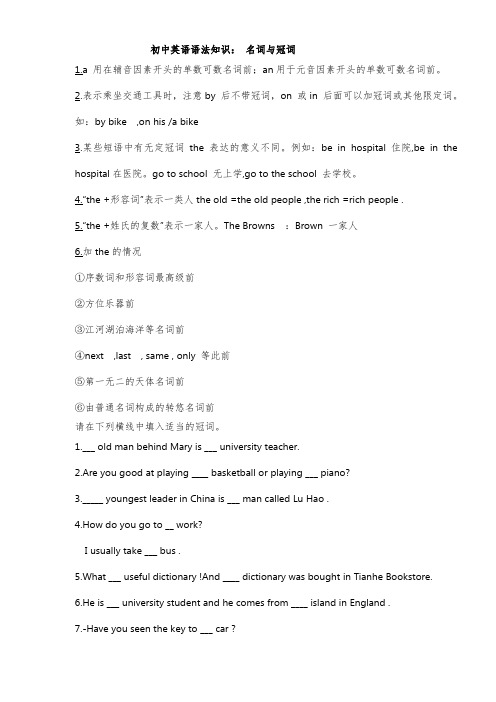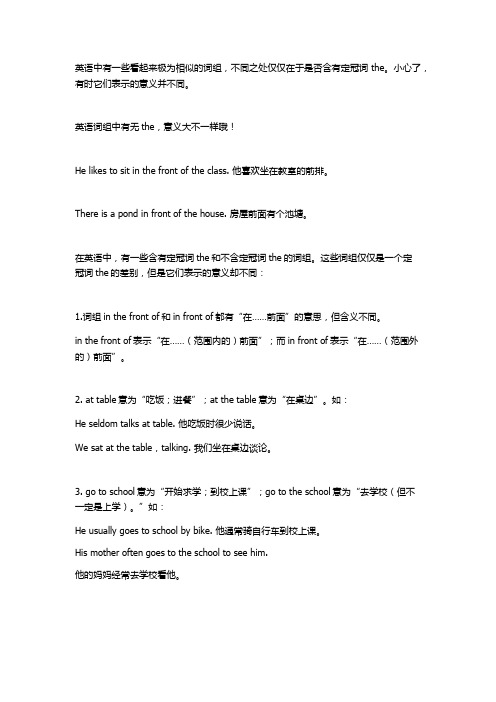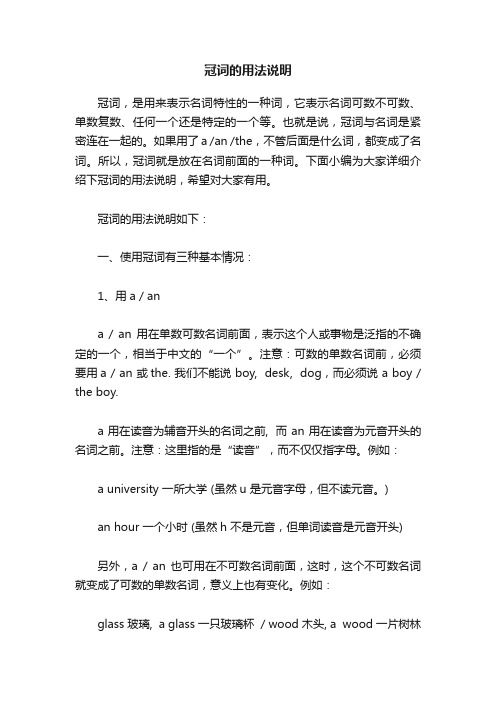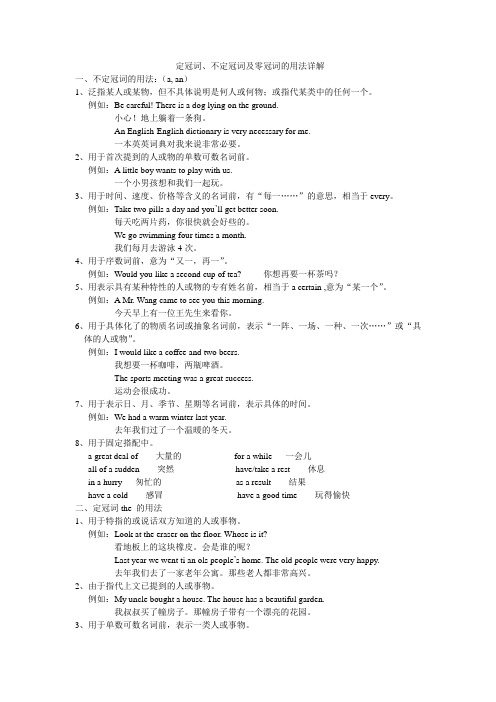有无冠词意义不同的短语
初中英语语法知识名词与冠词

初中英语语法知识:名词与冠词1.a 用在辅音因素开头的单数可数名词前;an用于元音因素开头的单数可数名词前。
2.表示乘坐交通工具时,注意by 后不带冠词,on 或in 后面可以加冠词或其他限定词。
如:by bike ,on his /a bike3.某些短语中有无定冠词the表达的意义不同。
例如:be in hospital 住院,be in the hospital在医院。
go to school 无上学,go to the school 去学校。
4.“the +形容词”表示一类人the old =the old people ,the rich =rich people .5.“the +姓氏的复数”表示一家人。
The Browns :Brown 一家人6.加the的情况①序数词和形容词最高级前②方位乐器前③江河湖泊海洋等名词前④next ,last , same , only 等此前⑤第一无二的天体名词前⑥由普通名词构成的转悠名词前请在下列横线中填入适当的冠词。
1.___ old man behind Mary is ___ university teacher.2.Are you good at playing ____ basketball or playing ___ piano?3._____ youngest leader in China is ___ man called Lu Hao .4.How do you go to __ work?I usually take ___ bus .5.What ___ useful dictionary !And ____ dictionary was bought in Tianhe Bookstore.6.He is ___ university student and he comes from ____ island in England .7.-Have you seen the key to ___ car ?-I think ___ key is on the desk .8.-How far is it from our school to ___ seaside? -It is ___ eight – kilometer walk from here .9.I have got ___ bad headache all day ,so I think I’ll go to bed early .10.If you go by ___ train ,you can have quite a comfortable trip ,but make sure you get __ fast one .11.She has been in ___hospital for three days .We go to ___ hospital to see her every day .12.There is ____ book on the shelf .Would you please get ___book for me ?13.Learning ____ country’s language is a better way of knowing ____culture behind it .14.I hope we can fly to ___moon one day .7.数词加名词作定语时,有两种表达。
有无The意义大不一样的那些词组

英语中有一些看起来极为相似的词组,不同之处仅仅在于是否含有定冠词the。
小心了,有时它们表示的意义并不同。
英语词组中有无the,意义大不一样哦!He likes to sit in the front of the class. 他喜欢坐在教室的前排。
There is a pond in front of the house. 房屋前面有个池塘。
在英语中,有一些含有定冠词the和不含定冠词the的词组。
这些词组仅仅是一个定冠词the的差别,但是它们表示的意义却不同:1.词组in the front of和in front of都有“在……前面”的意思,但含义不同。
in the front of表示“在……(范围内的)前面”;而in front of表示“在……(范围外的)前面”。
2. at table意为“吃饭;进餐”;at the table意为“在桌边”。
如:He seldom talks at table. 他吃饭时很少说话。
We sat at the table,talking. 我们坐在桌边谈论。
3. go to school意为“开始求学;到校上课”;go to the school意为“去学校(但不一定是上学)。
”如:He usually goes to school by bike. 他通常骑自行车到校上课。
His mother often goes to the school to see him.他的妈妈经常去学校看他。
4. in charge of(=take charge of),意为“主管;看管;在……看管之下”,主语是人;in the charge of意为“负责管理;负责照料”,主语是事物(物)。
如:Teacher Wang was in charge of our class. 王老师负责我们班级。
Our class was in the charge of teacher Wang.我们班级由王老师负责管理。
牛津上海版 八年级第一学期8A语法冠词专项讲解及练习(有答案)

语法冠词不定冠词类别1)表示一类人或物A boy is not always cleverer than a girl.An elephant is much stronger than a man.2)表身份She is not a high school teacher, but a university teacher.数量3)单数名词前表示“一”There is a table and four chairs in that dinning-room.4)用于序数词前表示“又一,再一”I tried a third time, but failed again.度量5)用于速度、价格、时间等单位名词前,表示“每一”的意思I go shopping twice a week.Miss Kate can type about 200 letters a minute.The car moved 70 miles an hour.6)固定短语Ps: a\an与one区别1. a\an强调类别,不强调数量;one是数词,强调数量,不强调类别。
An orange is orange. 橘子是橙色的。
He has an English-Chinese dictionary. 他有一本英汉字典。
2. 表示数量时,a\an可与one互换,但在某些习语中却不行。
an hour or two=one or two hours a year and a half= one and a half years one another 固定短语一点a little\a bit\a few许多a number ofa lot of玩的开心have a good time感冒have a cold休息have a rest匆忙的in a hurry过一会儿after a while试一试have a try一种a kind of定冠词A.表特指The man with a flower in his hand is Jack.B.可数名词单数前,表示类别The horse is taller than the dog.C.独一无二的名词前The earth moves around the sun.D.序数词和形容词最高级前Who is the first one to arrive at school?E.用于方位词前北京位于中国的北方。
很好!原创!精讲冠词之有无的差别

冠词有无的差别(2)
②无冠词表含义)
in charge of 看护,负责 in the charge of 由...看护,由...负责 in possession of 拥有in the possession of由…拥有 e.g. Tom is in charge of the task. 汤姆负责这件任务 The task is in the charge of Tom.这件任务由汤姆负责 ③在一些固定短语中意义差别较大 Without/out of question 毫无疑问 out of the question 不可能 eg. It’s out of the question to finish the huge job in such short time. 这么短的时间完成这样大的工作是不可能的。 behind time 迟到(常理) behind the times 落在时代后 by day 在白天 (常理) by the day 按日计算 by sea 乘船 by the sea 在海边 in front of 在...(外面的)前面 in the front of 在...(内部的前面) in place 在适当位置/in the place 在这个地方 (be) in place of /take the place of 代替
冠词有无的差别(1) ①无冠词时多指在对应的地方或环境做(常理)应该做的事 in hospital (常理)住院 in the hospital在医院中工作或其他事情 at table (常理)在进餐 at the table 坐在桌旁 in prison (常理)坐牢 in the prison 在监狱中工作或其他事情 at school/go to school上学(常理) at the school /go to the school去学校其他事 go to bed; get into/out of bed上床/起床; in bed 表示“卧病在床、躺在床上” e.g. Reading in bed is bad for eyes. 躺在床上看书对眼睛有害 in the bed: 不常用,表“在床里面,即在被窝里”。 e.g. In winter,he wanted to do nothing but sleep in the bed. “冬天,他什么也不相干,只想在被窝里睡觉” on the/one’s bed表示“在某张/某人的床上”多指物品的放置等 His toys are always on the bed. 他的玩具总是在那张床上(放着)
冠词的用法说明

冠词的用法说明冠词,是用来表示名词特性的一种词,它表示名词可数不可数、单数复数、任何一个还是特定的一个等。
也就是说,冠词与名词是紧密连在一起的。
如果用了a /an /the,不管后面是什么词,都变成了名词。
所以,冠词就是放在名词前面的一种词。
下面小编为大家详细介绍下冠词的用法说明,希望对大家有用。
冠词的用法说明如下:一、使用冠词有三种基本情况:1、用a / ana / an 用在单数可数名词前面,表示这个人或事物是泛指的不确定的一个,相当于中文的“一个”。
注意:可数的单数名词前,必须要用a / an 或the. 我们不能说 boy, desk, dog,而必须说 a boy / the boy.a 用在读音为辅音开头的名词之前, 而 an 用在读音为元音开头的名词之前。
注意:这里指的是“读音”,而不仅仅指字母。
例如:a university 一所大学 (虽然u 是元音字母,但不读元音。
)an hour 一个小时 (虽然h 不是元音,但单词读音是元音开头)另外,a / an 也可用在不可数名词前面,这时,这个不可数名词就变成了可数的单数名词,意义上也有变化。
例如:glass 玻璃, a glass 一只玻璃杯 / wood 木头, a wood 一片树林power威力, a power大国 / beauty 美丽, a beauty美人, 美的事物2、用thethe 相当于this/that 或these / those,总的用法是表示特定的人或事物。
the 的用法最广,不管是可数还是不可数,不管是单数还是复数,都可以用the. 具体用法见下面的讲解。
3、不用冠词有的时候,名词前面不用任何冠词,没有a / an / the. 有的书上称为零冠词。
不可数名词前可以不用冠词,可数的复数名词也可以不用,还有一些习惯用法上不需要用。
下面,详细讲一个冠词的用法。
二、不定冠词的用法:1、表示某一类人或某事物中的任何一个, 通常在第一次提到某人或某物时用a / an,以表示与其他事物的区别。
冠词用法小结

、、冠词定义:冠词是置于名词之前,对名词起限制作用的一种虚词。
冠词可以说是名词的一种标志,它不能离开名词而独立存在。
(不定冠词、定冠词、零冠词)冠词学习小窍门:在有些词组中,有无冠词含义不同。
如:in front of 在…..的前面in the front of 在……的前部at table 就餐at the table 在桌边go to school 去上学go to the school 去这个学校by sea 乘船by the sea 在海边一、不定冠词挑帽子——不定冠词a, an 用法口诀:冠词a, an 两顶帽,许多名词常需要。
开头发音若是元,要把an 帽来戴好。
辅音起首戴a 帽,记住规律莫乱套。
说明:不定冠词an 用在元音音素开头的名词前。
例如:an egg. 即使单词拼写以辅音字母开头,如果词的读音是元音开头,也要用an,例如:an hour, an honest boy.反之即使拼写以元音字母开头但读音是辅音,加不定冠词时要用a,例如: a university,a uniform.不定冠词的用法种类:1. 用于可数名词的单数形式前,表示"一" There is a tiger in the zoo.动物园里有一只老虎。
2. 表示一类人和东西A tiger can be dangerous. 老虎可能有危害性。
也可用定冠词the+形容词代表一类人)The poor are still poor.3. 表示"某一个"的意思A gentleman wants to see you. 有一位先生要见你。
4. 表示"同一"的意思They are nearly of an age. 他们几乎同岁。
The two shirts are much of a size. 这两件衬衫大小差不多。
5. 表示"每一"的意思We go swimming four times a week. 我们每周去游泳四次。
(完整版)定冠词、不定冠词、零冠词的用法详解

定冠词、不定冠词及零冠词的用法详解一、不定冠词的用法:(a, an)1、泛指某人或某物,但不具体说明是何人或何物;或指代某类中的任何一个。
例如:Be careful! There is a dog lying on the ground.小心!地上躺着一条狗。
An English-English dictionary is very necessary for me.一本英英词典对我来说非常必要。
2、用于首次提到的人或物的单数可数名词前。
例如:A little boy wants to play with us.一个小男孩想和我们一起玩。
3、用于时间、速度、价格等含义的名词前,有“每一……”的意思,相当于every。
例如:Take two pills a day and you’ll get better soon.每天吃两片药,你很快就会好些的。
We go swimming four times a month.我们每月去游泳4次。
4、用于序数词前,意为“又一,再一”。
例如:Would you like a second cup of tea? 你想再要一杯茶吗?5、用表示具有某种特性的人或物的专有姓名前,相当于a certain ,意为“某一个”。
例如:A Mr. Wang came to see you this morning.今天早上有一位王先生来看你。
6、用于具体化了的物质名词或抽象名词前,表示“一阵、一场、一种、一次……”或“具体的人或物”。
例如:I would like a coffee and two beers.我想要一杯咖啡,两瓶啤酒。
The sports meeting was a great success.运动会很成功。
7、用于表示日、月、季节、星期等名词前,表示具体的时间。
例如:We had a warm winter last year.去年我们过了一个温暖的冬天。
冠词a,an,the的用法及练习题(含答案)

冠词a, an, the的用法及练习要点:冠词是一种虚词,放在名词的前面,帮助说明名词的含义。
冠词分不定冠词(The Indefinite Article)和定冠词(The definite Article)两种。
a (an)是不定冠词,a用在辅音之前:如a book, a man; an用在元音因素之前,如:an old man, an hour, an interesting book等;the是定冠词;零冠词,是指不使用冠词的情形。
一、不定冠词a(an)的用法:1.表示“一个”、“某一个”、“每一”、“再一、又一”或“同一,相同”等,但没有one强烈。
e.g.: Rome is not built in a day. 罗马不是一天建成的。
A Mr. Smith is waiting for you at the school gate. 一个叫Smith的先生在校门口等你。
He usually works eight hours a day. 他通常一天工作8小时。
You can try it a second time if you fail. 如果你失败了,可以再试一次。
They are of an age. 他们的年龄一样大。
Birds of a feather flocks together. 物以类聚,人以群分。
2.泛指某一类人或物,意为“任何一个,任一”。
e.g.: A square has four sides. 正方形有四条边。
A car must be insured. 汽车一定要上保险。
A soldier must obey orders. 军人必须服从命令。
3.当物质名词具体化表示“一(类、阵、份)”等;抽象名词具体化为“…的人或者事”时。
e.g.: Green tea is a wonderful tea. 绿茶是一种极好的茶。
We don’t have much rain here, but last night we had a heavy rain.我们这里雨水不多,但昨晚下了一场大雨。
- 1、下载文档前请自行甄别文档内容的完整性,平台不提供额外的编辑、内容补充、找答案等附加服务。
- 2、"仅部分预览"的文档,不可在线预览部分如存在完整性等问题,可反馈申请退款(可完整预览的文档不适用该条件!)。
- 3、如文档侵犯您的权益,请联系客服反馈,我们会尽快为您处理(人工客服工作时间:9:00-18:30)。
有无冠词意义不同的短语:
1. at table 在进餐时at the table 坐在桌旁
2. a knife and fork 刀叉 a knife and a fork 一把刀子和一把叉子
3. by hand 手工做的by the hand 挽着手
4. by day 在白天by the day 按天计算
5. by sea 乘船by the sea在海滨
6. in hospital 住院in the hospital 在医院
7. in front of 在……的前面in the front of 在……的前部
8. in secret 秘密地,暗地里in the secret 知道内情
9. in place of 代替in the place of 在……的地方
10. in red 身穿in the red 赤字,亏损
11. in case of 万一in the case of 就……来说,至于
12. in word 口头上,表面上in a word 总之
13. have words with 与……争吵have a word with 与……说句话
14. make beds 造床make the bed 整理床铺
15. keep house 管理家务keep the house 守在家里,居家不外出
16. in sight of 看得见in the sight of 从……的观点来看
17. in charge of 负责in the charge of 由……负责
18. take place 发生take the place 取代
19. of age 成年of the age 同龄
20. out of question 不成问题out of the question 根本不可能
单数形式与其复数形式含义不同的词:
1. advice 劝告advices 消息
2. age 年龄ages 很久
3. arm 手臂arms 武器
4. brain 大脑brains 智力
5. cloth 布料clothes 衣服
6. condition 条件conditions 环境
7. color 颜色colors 旗帜
8. content 内容contents 目录
9. custom 风俗customs 海关
10. force 力量forces 军队
11. feeling 感觉feelings 感情,心情
12. glass 玻璃glasses 眼睛
13. good 利益goods 商品,货物
14. green 绿色greens 蔬菜
15. letter 字母letters 文学
16. look 看looks 外表
17. manner 方式manners 礼貌
18. pain 痛苦pains 辛苦
19. paper 纸papers 论文,文章,文件
20. return 归还returns 长寿
21. regard 尊重regards问候
22. sand 沙子sands 沙滩
23. spirit 精神spirits 情绪
24. short 短,短片shorts 短裤
25. time 时间times 时代
26. work 工作works 作品,工厂
27. water 水waters 水域
28. wood 木头woods 树林
含介词to的常用短语:
look forward to 盼望belong to 属于
refer to 指的是prefer …to 宁愿……而不是give way to 对……让步find one’s way to设法到达be equal to 等于devote oneself to 致力于
get down to 着手做see to 照料,处理
be opposed to 反对lead to 导致
object to 反对be open to 愿意接受
stick to 坚持be sentenced to 被判刑
be used to 习惯于turn to 求助于
give rise to 引起reduce to 减少到
pay attention to 注意help oneself to 自顾,随便吃只用不定式作宾语的动词:
agree 同意arrange 安排
ask 请求beg 祈求
choose 选择dare 敢于
decide 决定demand 要求
design 设计expect 期待
fail 未能hope 希望
intend 打算learn 学会
manage 设法offer 提供
plan 计划prepare 准备
pretend 假装promise 许诺
refuse 拒绝wish 希望
只跟动词的-ing形式:
advise 建议,劝告allow 允许
admit 承认avoid 避免
consider 考虑delay 推迟
doubt 怀疑dislike 讨厌
enjoy 喜欢escape 逃避
excuse 原谅finish 完成
imagine 想象include 包括
keep 保持mind 介意
miss 错过practice 练习
prevent 防止resist 抵制risk 冒险suggest 建议give up 放弃insist on 坚持put off 推迟feel like 想要be worth 值得be busy 忙于。
